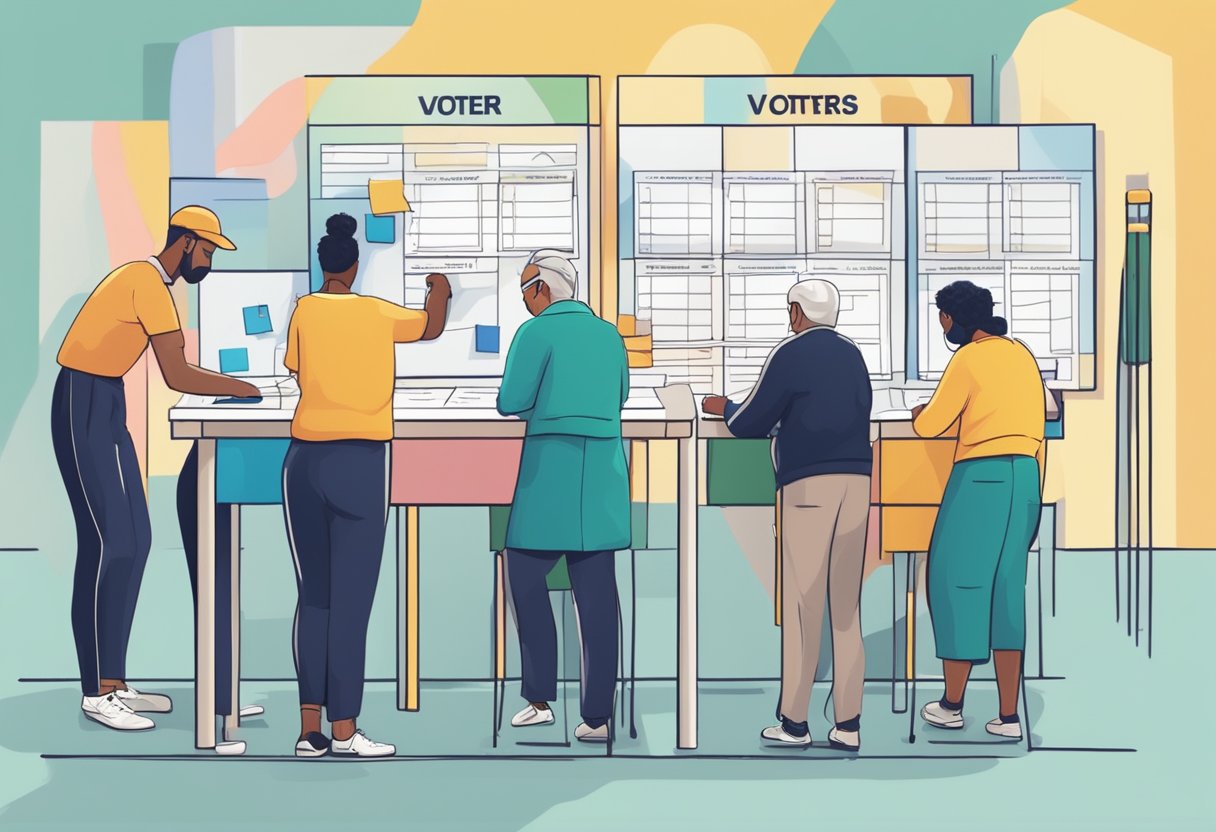Betting on the outcome of political events such as the UK General Election can be an intriguing prospect for many. With the looming 2024 General Election, bookmakers and political pundits alike are observing trends and movements within party lines to offer odds to those willing to place their bets. The question of whether it is worth betting hinges upon various factors such as historical election results, the reliability of opinion polls, and the current political landscape.
In the context of UK General Elections, historically, certain trends and precedences offer insights that may inform betting decisions. Both the performance of political parties in previous elections and the key figures leading them play a significant role. In addition, understanding the intricacies of the electoral system and the process by which votes are cast and counted provides a foundation for assessing election outcomes.
The political environment leading up to the 2024 election is shaping up to be a crucial determinant of the betting odds. Opinion polls and forecasts paint pictures of potential results, but the inherent unpredictability of political contests must be kept in mind. Electoral campaigns’ strategic implications, regional focus, and the timeline of events up to May 2024 must be considered by anyone looking to place a wager on the election.
Key Takeaways
- The viability of betting on the UK General Election depends on historical data, opinion polls, and the present political climate.
- An understanding of the UK’s electoral system and party dynamics is essential in making informed betting decisions.
- The 2024 UK General Election presents a dynamic political event with shifts in public discourse and strategic campaigning influencing its outcome.
Need Help Beating the Bookies?
Our expert betting tipsters have been taking cash off the bookies since 2014! If you need a helping hand with winning then why not check them out?
Browse Our Tipsters
Punter’s Profit Pro
One of the Most Reliable and Consistent Horse Racing Tipsters at Betting Gods
Visit PROFILE
Premier Greyhound Tips
Michael is Our Dedicated Greyhound Racing Tipster (with Results Dating Back to 2014!)
Visit PROFILEHistorical Context and Precedence
When considering the worthiness of betting on the UK General Election of 2024, an understanding of the historical context and the impact of the prior political landscape is essential.
Overview of Past UK General Elections
The UK General Elections have historically been a duel between the two major parties: the Conservatives and Labour. Elections before 2013 were characterised by shifts in power between these parties, with third parties like the Liberal Democrats (Lib Dem) and the Scottish National Party (SNP) playing influential albeit less dominant roles.
Historical data from past General Elections can reflect patterns of voter behaviour and electoral swings. For instance, unexpected results, such as the coalition formed in 2010, underscore the potential volatility and unpredictability of the UK electorate.
Significance of the 2023 Political Landscape
The 2023 political landscape set a critical backdrop for the 2024 General Election. Events in 2023 have had considerable influence over public opinion, potentially shaping the direction of the upcoming vote. Parties have been adjusting their strategies based on the socio-political climate which included economic challenges and policy responses that may sway voter allegiance.
The performance of current government officials and the efficacy of their policies, as interpreted by the public, must be factored into any betting considerations. Party dynamics and leadership ratings often serve as key indicators of election outcomes, significantly affecting betting odds.
Political Parties and Key Figures
With the UK General Election 2024 on the horizon, the political landscape is shaping up around various party leaders and their policies. This section examines the key parties and figures that are poised to play crucial roles in the upcoming election.
The Conservative Party and Rishi Sunak
The Conservative Party, often referred to as the Tories, is one of the two major political parties in the UK. Rishi Sunak, the party leader, serves as a significant figurehead with a focus on economic policies and party unity. Sunak, an MP since 2015 and former Chancellor of the Exchequer, has navigated complex fiscal challenges and is now presenting his vision for the nation’s future as he stands for the role of Prime Minister.
Labour Party: Prospects and Challenges
The Labour Party, historically the main opposition to the Conservatives, is known for its centre-left stance and emphasis on social justice and workers’ rights. Labour’s electoral prospects have fluctuated in recent years, but they have been showing positive signs in recent polls. The party faces the challenge of maintaining momentum and unity while setting forth policies that resonate with a diverse voter base.
Minor Parties: SNP, Lib Dem and Others
-
SNP (Scottish National Party): Predominantly focused on Scotland, the SNP advocates for Scottish independence and retains significant influence within Scotland. The party’s vote share typically influences the national conversation and can impact coalition formations.
-
Liberal Democrats (Lib Dem): The Lib Dems often position themselves between the larger parties and are key players in their own right. They aim for socially liberal policies and have a notable grassroots presence across various constituencies.
-
Other minor parties also contribute to the intricate mosaic of UK politics, each vying for influence through distinct policy propositions and regional support bases.
Electoral System and Voting Process

To understand the stakes of betting on the UK General Election of 2024, it is essential to grasp the fundamentals of the electoral system and how voting preferences are predicted.
Understanding Constituencies and MPs
The United Kingdom is divided into areas known as constituencies, each represented by a Member of Parliament (MP). During a General Election, voters in each constituency elect one MP to represent them in the House of Commons. The party that secures a majority of these seats typically forms the government. With boundary changes ahead of the 2024 election, the precise map of constituencies may have shifted since the last election in 2019.
Voting Intention and The Role of Pollsters
Pollsters play a critical role in gauging the public’s voting intention leading up to the General Election. They conduct surveys that indicate which party or candidate is favoured in various areas. While these polls provide a snapshot of current political leanings, they do not directly predict the number of seats each party will win, which is the crucial factor in the first-past-the-post electoral system. It is important to consider that opinion polls may fluctuate and are subject to margins of error.
Current Political Environment
The upcoming UK General Election in 2024 is unfolding amidst a highly charged political climate, heavily influenced by the government’s performance, economic policies, and the monarchy’s role.
Government Performance and Public Services
The government has seen varying levels of public satisfaction relating to its handling of public services. Discrepancies in service delivery and the effectiveness of implemented policies are being closely scrutinised by voters. Service sectors such as health, education, and transportation are key areas where the government’s performance is continuously assessed, setting the stage for electoral consequences.
Tax Cuts, Economic Policies and Public Opinion
Tax cuts and economic policies are central to the political debate, shaping public opinion ahead of the election. The electorate’s response to these policies is critical, as they often tie their personal financial situation to the fiscal decisions made by those in power. Economic measures taken by the government, including adjustments to taxation, can sway the voting populace, reflecting directly in poll numbers.
The Influence of King Charles III
While the role of the monarch, King Charles III, is principally ceremonial, his influence on the nation’s sentiment is palpable. He does not partake in parliamentary debates or legislative processes, yet his engagements and speeches resonate with the public. However, Parliament remains the sovereign body for legislation, with MPs responsible for the democratic process.
Each of these factors plays a significant part in the intricate tapestry of the 2024 General Election. Voters are closely monitoring the government’s handling of public services, economic measures including tax policies, and the monarchy’s societal impact, all of which may tip the scales in a tightly contested political race.
Opinion Polls and Election Forecasts
The outcome of the UK General Election 2024 could hinge on the accuracy of opinion polls and the potential for minority governments or coalitions. These polls and forecasts play a crucial role in shaping both public perception and strategic betting decisions.
Analysing Polls and Predicting Voter Behaviour
Recent opinion polls indicate a lead for the Labour Party, with their average national vote share outpacing their main rivals. Voting intention ranges, however, show some variance, reflecting a degree of uncertainty. Analysing these polls requires looking beyond raw percentages, considering factors like historical polling accuracy, demographic shifts, and current events that may sway voter behaviour.
- Latest Polling Data (as of February 19, 2024):
- Labour: 37% – 43%
- Conservatives: 29% – 35%
- Liberal Democrats: 8% – 14%
- SNP: 3% – 5%* (across Great Britain)
*It’s important to note that the SNP contests seats only in Scotland, which impacts the overall UK-wide seat distribution.
Potential for Minority Governments or Coalitions
With no single party securing a clear majority, a minority government or a coalition becomes a distinct possibility. The strength of smaller parties like the SNP, alongside newcomers like Reform UK, could be influential in a balanced parliament where they might hold the balance of power. Past elections have affirmed that coalitions can significantly influence policy direction and governance stability.
In summary, polls suggest a lead for Labour with a notable level of variation, indicating the potential for a minority or coalition government. Those considering betting on the election outcome should weigh these factors carefully, particularly with regard to the role smaller parties may play.
Betting on Political Outcomes
In the dynamic landscape of UK politics, betting on election outcomes has emerged as a significant market for punters. The intrigue not only lies in predicting the victor but also in gauging the shifting political tides that influence the odds.
Assessing the Odds: Favourites and Underdogs
Bookmakers assign odds to potential outcomes, with lower odds for expected winners (favourites) and higher odds for less likely winners (underdogs). For instance, current odds might reflect the probability of a general election occurring within a specified timeframe, such as October-December 2024, with specific odds indicating perceived likelihood.
- Favourites: Highlighted by lower odds, indicating higher confidence from bookmakers.
- Underdogs: Presented with higher odds, suggesting a lower probability of the event occurring but a higher payout if it does.
The Role of Betting Agencies like Ladbrokes
Agencies such as Ladbrokes operate as intermediaries, setting odds and accepting bets. They play a crucial role in the industry, continually updating odds based on political events, betting patterns, and expert analysis.
- Ladbrokes: A major bookmaker that provides a platform and sets odds for political betting.
- Odds Calculation: Utilises data and specialist knowledge to offer real-time odds to bettors.
Legal and Ethical Considerations of Political Betting
Betting on political outcomes is legal in the UK, although it is subject to regulatory oversight. Ethically, it raises questions about the influence of gambling on democratic processes.
- Regulation: Overseen by entities such as the Gambling Commission to ensure fair practices.
- Ethics: Debated for its potential impact on public opinion and electoral engagement.
Strategic Implications for Political Campaigns
In the landscape of the UK’s general elections, the effectiveness of campaign strategies is pivotal. They shape the political narrative and can influence voter behaviour significantly.
Campaign Promotions and Messaging
Campaigns must craft their promotions and messaging with acute precision. Strategic messaging determines not only party alignment with public sentiment but also sets the tone for political discourse. In 2024, the Conservative and Labour parties are likely to anchor their campaigns on economic competence and social justice, respectively. A campaign’s success hinges on their ability to distil complex policies into compelling narratives that resonate with the electorate. Key components often include:
- Identifying core issues that concern voters
- Aligning policies with these concerns
- Communicating effectively across various media platforms
The Impact of Elections on Businesses and Clients
Political campaigns and election outcomes directly influence the UK’s business environment. Clients often seek to understand the implications of election promises on their sectors. Should a party with a platform of regulatory reform for the financial sector ascend, businesses in that domain may need to anticipate changes and adjust their operational strategies accordingly. Election results can precipitate or deter investment, alter consumer confidence, and impact currency stability. Thus, businesses keep a keen eye on election promotion trends, often employing analytical models to predict possible outcomes and prepare for the future.
Speculation and Public Discourse
The anticipation surrounding the UK General Election 2024 has fuelled a wave of speculation and public discourse. This conversation is shaped significantly by the media’s portrayal and the public’s response to the unfolding political landscape.
Media Influence and the Speculation Cycle
The media plays a critical role in fuelling election speculation. Reports, such as the persistent rumours of a possible May general election, despite Prime Minister Rishi Sunak’s dismissal, demonstrate the media’s power in crafting narratives that can sway public perception. This continuous cycle of speculation can be driven by various factors including statements from political figures and historical precedents.
- Statements: Public figures can inadvertently impact speculation. For example, Shadow Paymaster General Jonathan Ashworth’s wager on a May election adds a tangible dimension to mere speculation.
- Historical Precedents: Media outlets often reference past election timelines to predict the next. The dissolution of parliament needed for a potential May election would align with constitutional requirements but remains speculative.
Public Expectations and the Winner’s Curse
The public’s expectations can lead to what is termed the ‘winner’s curse’—a scenario where the outcome of an election bet does not live up to the expectations set by the speculation. The intensity of public discourse influences individual and collective expectations, which can be heightened by media reports and polls showing a leading party or candidate.
- Opinion Polls: Media reports of opinion polls, such as a Labour lead, can stoke public expectations of an election result.
- Financial Risks: Betting on elections carries financial risks exacerbated by the winner’s curse. If widespread speculation creates a consensus around the ‘winning’ bet, it can influence betting odds and result in lower returns for bettors.
The dynamics between media influence and public expectations are interconnected, with each shaping the other in the lead-up to the UK General Election 2024.
Timeline leading up to May 2024
In the run-up to the 2024 UK General Election, various key dates and milestones set the scene for what is expected to be a hotly contested battle at the polls. The period from late 2023 into 2024 is critical, with potential policy announcements, leadership campaigns, and the overall political climate shaping the strategies of the competing parties.
Key Dates and Milestones
- October 2023: The autumn conference season concluded, with parties crystallising their manifestos and campaign strategies.
- December 2023: A review of the year’s political developments influenced the campaigning approaches of parties and, possibly, betting odds.
Moving into 2024, the timeline intensifies:
- January 2024: The New Year marks the final stretch for parties to solidify their positions and rally supporters.
- April 2024: Campaigning reaches its zenith, as parties make their final pushes to sway voters.
The Final Months: November to May
The final months leading up to the General Election in May 2024 are crucial. Individual constituencies become battlegrounds for candidates to canvas, debates intensify, and manifesto promises are scrutinised.
By the time May arrives, the nation will be focused on the ballots:
- Early May 2024: The United Kingdom goes to the polls. Candidates and parties await the verdict of the voters, leading to a momentous conclusion that will shape the country’s future.
Regional Focus and Constituency Battles
The 2024 UK General Election is set to be an intricate contest, with changes in constituencies likely influencing the overall outcome. The focus on regional dynamics and key battles in individual constituencies will be crucial for parties aiming for a majority.
London: A Microcosm of National Politics
London’s diverse political landscape often reflects broader national trends. With several marginal seats, Labour aims to retain its dominance in the city but faces challenges from other parties capitalising on local issues. The city’s electorate is pivotal, not just because of the number of seats but also due to London’s symbolic significance as the nation’s capital.
Marginal Seats and Targeted Campaigns
Betting on the UK General Election also involves analysing marginal seats, where small shifts in voter sentiment can lead to a change in representation. Targeted campaigns in these constituencies can make a significant difference. Political parties meticulously strategise to sway these areas, as they can collectively determine the Labour party’s capacity to secure a majority or the necessity for a coalition government.
Parties will hone in on these and other similar constituencies, allocating resources and tailoring their messages to the specific concerns and demographics of each area. This regional focus, particularly in London and other battleground regions, will be a decisive factor in the race for parliamentary majority.
Frequently Asked Questions
This section answers common queries related to wagering on the outcome of the 2024 UK General Election with up-to-date betting insights and analysis.
What are the latest betting odds for the upcoming UK General Election?
The latest odds suggest the Conservative Party is expected to lose a significant number of seats, with the odds on an autumn General Election having shortened. Labour appears to be the favourite for a majority, with odds reflecting this stance.
How can one interpret the odds given for different political parties in the General Election?
The odds represent probabilities as perceived by bettors and oddsmakers. If a party has lower odds, it is considered more likely to win. For instance, shorter odds for Labour suggest a higher confidence among bettors in their potential victory.
What factors should be considered when predicting the winning party of the 2024 UK General Election?
Voter sentiments, recent political events, leadership approval ratings, party policies, economic performance, and historical voting patterns are key factors. Assume that one’s prediction may be influenced by unexpected developments.
How do the odds for the General Election date reflect the political climate?
Odds on the election date can indicate perceived stability or volatility in the political landscape. Shortened odds for an autumn election might signal bettor belief in political shifts or pressures necessitating an earlier election.
Can the history of General Election outcomes be used to inform betting strategies?
Yes, historical analysis can highlight trends and voter behaviour, but it’s essential to consider the context of the current political environment, which can significantly differ from past conditions.
Are there any patterns in the betting trends leading up to UK General Elections that could indicate probable outcomes?
Betting trends often shift with public opinion polls and political developments. Consistent trends towards one party might suggest electoral leaning, but anticipate fluctuations as the election date approaches.




